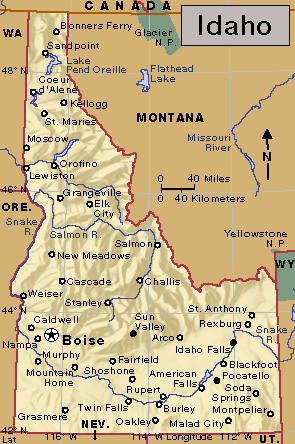Pocatello, << `poh` kuh TEHL oh, >> Idaho (pop. 56,320; met. area pop. 87,018), is a rail and highway gateway to the Pacific Northwest. It is the seat of Bannock County. The city lies in a rich, irrigated farming area along the Portneuf River at the western edge of the Rocky Mountains.

Factories in greater Pocatello make semiconductors, phosphate fertilizers, medical products, livestock feed, food products, and flour. Other leading sectors are education, health care, mining, tourism, and transportation. The city is the home of Idaho State University. Tourists visit Caribou-Targhee National Forest, the Idaho Museum of Natural History, Ross Park, the Shoshone Bannock Tribal Museum, and nearby national parks and ski areas.
Pocatello was founded in 1882 when the Union Pacific Railroad developed its Oregon Short Line westward through the area. Land was formally unavailable to settlers until 1891, because the area was part of the Fort Hall Indian Reservation. The city was incorporated in 1889, and was named after a Bannock Indian chief. It grew steadily with the progress of the Union Pacific Railroad, which maintains large yards there. Pocatello has a mayor-council form of government.
